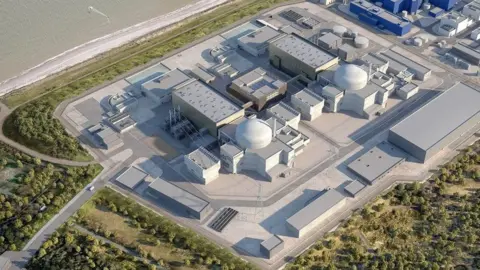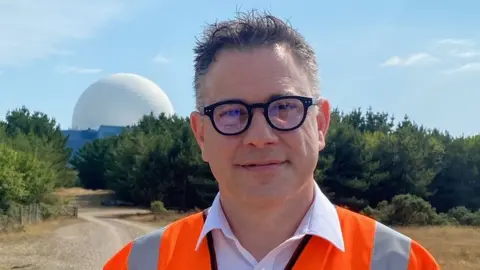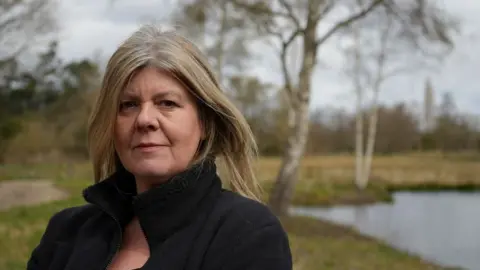Sizewell C nuclear plant gets go-ahead from government
 Sizewell C
Sizewell CThe government has given the go-ahead for the new Sizewell C nuclear power plant on the Suffolk coast.
The project, mainly funded by the French energy company EDF, is expected to cost in the region of £20bn.
The company said the new plant would generate about 7% of the UK's electricity needs and operate for 60 years.
Campaigners Stop Sizewell C said they "will be looking closely at appealing this decision".
The new plant would be built next to the existing Sizewell B, which is still generating electricity, and Sizewell A, which has been decommissioned.
EDF said the new two-reactor plant could generate 3.2 gigawatts (GW) of electricity, enough for about six million homes.
Negotiations with the government on raising funds for the project are continuing and a decision on the finances is expected in 2023.
 Andrew Woodger/BBC
Andrew Woodger/BBCBusiness Secretary Kwasi Kwarteng confirmed the development consent and central government will make all future planning decisions on the plant as it is deemed to be a nationally significant infrastructure project.
The application was submitted to the Planning Inspectorate in May 2020.
The secretary of state overrode recommendations of the Planning Inspectorate not to grant the go-ahead for the scheme unless issues on water supplies and nature were resolved.
In its report, the examining authority said it recommended that "unless the outstanding water supply strategy can be resolved and sufficient information provided to enable the secretary of state to carry out his obligations under the Habitats Regulations, the case for an order granting development consent for the application is not made out".
The inspectorate's chief executive, Sarah Richards, said: "This examination took place during the Covid-19 pandemic and its associated restrictions, and the examining authority worked hard to ensure that local people, the local authorities - East Suffolk District Council and Suffolk County Council - and other interested parties were able to fully participate."

Tom McGarry, EDF's head of regional affairs, said the company would "proceed with humility".
"Regardless of where you stand on the project, I think everybody is pleased that we have arrived at a decision now," he said.
"What we have to make sure is that we work with the local communities to minimise construction when it begins and all throughout and also maximise the opportunities for Suffolk."
The government has committed £100m to developing the project and planned to take a 20% stake in the plant.
Local anti-nuclear campaigners have objected to the plant on several grounds, including that it would be built next to the RSPB's Minsmere nature reserve and have a negative effect on wildlife.

The campaign group Stop Sizewell C said it would continue to oppose the project and would be trying to find grounds to appeal against the decision.
Alison Downes, from the group, said: "We are going to continue challenging this project because of technical concerns, impacts on the environment, the investors, the fact that households are going to have to pay, the huge expense and potential for massive delays."
She claimed people in the local area were "devastated" by the latest decision.
"They're absolutely resolute and steadfast with us and our campaign to keep fighting against this damaging project," she said.
"This is going to be turned into the biggest building site in Europe and that will drive tourists and a lot of people who could make this a prosperous region away."
 Sizewell C
Sizewell CEast Suffolk Council is the local planning authority, but does not make decisions on Sizewell because of its national importance.
The Conservative-run council said it would review the development consent over the coming weeks.
Craig Rivett, deputy leader and cabinet member for economic development said they would work with the project stakeholders and the local community "to ensure that appropriate mitigation is in place to help lessen the impacts of the project during the construction phase".
Suffolk County Council said it was "disappointed that a number of key issues have not been fully resolved" including "the blight" of additional pylons no reference to removing a Sizewell link road once construction was completed.
The council added that Suffolk would benefit from nearly £200m of investment to mitigate the impact on communities, the environment and infrastructure and that a "far greater quantity of construction materials will be delivered by rail and sea, reducing the number of lorries on the county's rural roads".
However the GMB, which represents workers in the energy sector, said Sizewell C's approval was "a vital step forward for energy and net-zero".

 Jenny Kirk/BBC
Jenny Kirk/BBCAnalysis
By Esme Stallard, BBC Science and Climate Change reporter
The UK government plans to completely decarbonise the country's electricity by 2035. This means that all our electricity will be produced from renewable or low-carbon sources like solar, wind and nuclear.
Up to 24GW of nuclear-generated electricity is planned by 2050 - this is three times more than we have now and could provide up to 25% of our required electricity demand. The other 75% would therefore have to come from other forms of renewable or low-carbon.
All but one of the UK's existing nuclear power plants are due to stop generating by 2030, and begin the lengthy decommissioning process.
The government is aware of the need to accelerate plans to meet its decarbonising targets. And, therefore, of making a decision on Sizewell C.
Prime Minister Boris Johnson has also said that expanding the use of nuclear would help resist "bullying" from Russia, which dominates the European gas market, and build energy independence by providing a stable energy supply.
The energy produced from other low-carbon sources like solar and wind vary with the weather, until there is further development of energy storage technology.
Although nuclear is one of the greenest forms of energy - as measured by amount of greenhouse gas emissions produced per unit of energy - there are still some emissions associated with manufacturing the steel and other materials needed.
And the long-term environmental consequences of dealing with and storing nuclear waste remain unclear.

The Suffolk Coast and Heaths Area of Outstanding Natural Beauty (AONB) said it "hoped that many of the project benefits, claimed by the developer, would come to fruition" such as new jobs, low carbon electricity generation and development of habitats to make up for the loss of land.
Chairman of the AONB Partnership, Nick Collinson, said: "This part of England has been designated for its nature, tranquillity and scenic quality, much of which will be lost or damaged during the 9-12 year construction.
"The partnership will of course work constructively with EDF to ensure mitigation and compensation is maximised to minimise the damage to this special part of the world."
Campaign group, Greenpeace, called the project an "expensive white elephant" that was "trashing an important nature reserve".
Its chief scientist Dr Doug Parr said: "Rather than wasting time and money on this red herring energy solution, the government should throw everything at making cheaper, cleaner and more reliable renewables the backbone of our energy system."
Correction 21 July 2022: This piece has been updated to clarify that the Planning Inspectorate recommended against granting permission unless issues on water supplies and nature were resolved.

Find BBC News: East of England on Facebook, Instagram and Twitter. If you have a story suggestion email eastofenglandnews@bbc.co.uk